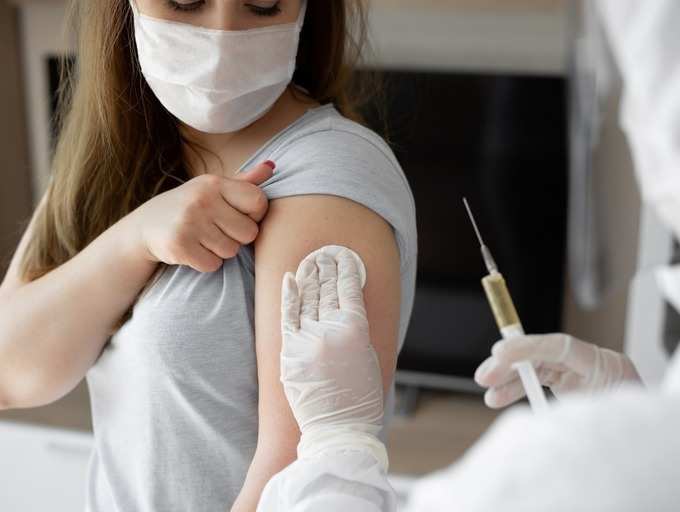Can't get your second COVID shot on time? Here's what experts want you to know
People are lining up to get their second COVID-19 vaccine shots

In just a little over two months, millions of people have been successfully vaccinated against novel coronavirus.
Many, including the ones in India, are waiting in line to get their second COVID shot, which is crucial to garner full-term protection and efficacy.
While getting both shots of the COVID vaccine is vital, experts are seeing a dip in the number of people turning up to get their shots. Vaccine hesitancy, fear of side-effects, mismatched schedules and unavailability are currently some of the reasons why doses are being missed.
The tight crunch of vaccine supplies is also forcing many to skip out on receiving timely doses.
Here's what you should know

Missing doses as per your turn may render the vaccine not working fully well. For any vaccine to work well, it's also important that they are administered in a given window, mentioned on the fact-sheet.
Therefore, if a person misses out on the second shot, or fails to get the shot in time, it can lead to difficulties.
However, there might still be ways to secure full protection against COVID-19, which is still claiming lives. If you are scheduled to get your second COVID-19 dose or maybe contemplating missing the date, here's what officials want you to know
Why are COVID-19 vaccines administered two doses apart?

Most vaccines being administered right now, in India and other countries are offered as a two-dose regime, which requires people to turn up for a repeat vaccine dose weeks after the initial jab is offered.
While a single dose regimen can save up supplies and speed up the process, vaccine doses administered weeks apart help strengthen immunity and generate antibodies needed to offer protection against COVID-19.
Can the second shot be delayed?

Under the current guidelines, two full doses of the vaccine are needed to offer full protection against the deadly virus. It should be noted that while a single dose of the vaccine can also offer some level of protection, a second dose will offer full efficacy right now. For example, if a vaccine has an established rate of 94%, the initial dose may offer 60% protection, while getting the second dose will help a person secure the full established level of efficacy, which is 94%.
In many cases, getting the second dose of the vaccine can also strengthen antibody count for those who may have an ill-functioning immune system, or compromised immunity, who may not see the vaccine working desirably well with the first jab.
Time delay can also differ, based on vaccines

The waiting window between vaccine doses can also differ based on the type of vaccine you are administered, and the ingredients in it.
In India, right now, the two vaccines which are being used right now are traditional vaccines, which are meant to be dosed 4-6 weeks apart for maximum efficacy.
In comparison to this, the mRNA vaccines, such as Moderna's and Pfizer's have a shorter waiting time. Pfizer's second shot is to be administered 21 days after the first dose, while Moderna's shot is to be given exactly 28 days after the first shot.
Will getting a vaccine after delayed time spoil its efficacy?

There's a huge doubt which concerns people who may miss their vaccine dose right now.
While vaccines have an ideal 'recommended' time period of inoculation (3-6 weeks, as mentioned above), there's no denying that not getting a second shot, or a delay in the second shot will render the vaccine completely ineffective.
The Centres of Disease Control and Prevention, (CDC) in a previous statement has also talked about the same. Accounting for miscellaneous gaps and unavailability of vaccines, officials say that while it may be ideal that vaccines are injected "as close to the recommended interval", the vaccine doses can still be delayed upto a while.
Some vaccines can be used for longer, say experts

For example, the newest data on Pfizer's vaccine model suggests that the vaccine can be administered 6 weeks apart as well. However, right now, there's limited study to suggest how it would affect the efficacy or protection rate.
Similar guidelines also exist for homegrown vaccines right now.
The important thing, as experts suggest is that people DO get the second dose, even in cases of delay. Side-effects and availability shouldn't stop you from getting the second dose. Only a second dose will garner you full, effective protection against the deadly virus.
It should also be noted that six weeks is the maximum time scientists and medical experts have established for now. It is yet unknown how effective a vaccine would be if administered after the six-week window.
It is also crucial that people oversee that they are getting the same vaccine, as they did before. Mixing vaccine doses or supplies may not give desirable results.
Can you get it earlier than the recommended time?

Unavailability and gaps may also prompt people to schedule their second vaccine appointment earlier than the stipulated date. This is one mistake CDC has advised people to not do.
Do remember that our immune system takes a while to work. It can take anywhere between a week to two, after the first shot for the body to start building up antibodies. Hence, second doses are best administered after a while. There's also not credible scientific proof available right now which promotes the administration of a vaccine dose before time. Therefore, it's best advised to wait for your turn, see how your body reacts and then get the shots.
Waiting for 2-3 weeks after the first dose will also help you observe for any unpleasant side-effects, which may force you to delay or postpone the second shot. Hence, follow your doctor's advise diligently, and do not take any action which harms the working of your vaccine right now.